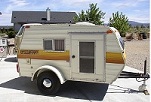So.. you folks with the trailer tires...are you replacing them every 3-5 years due to rubber aging? That was on the link one of the previous posters, um, posted.
I am not set either way. It makes sense to put trailer tires on a trailer. They are on my big trailer. I'm not made of money, but the cost isn't the issue. Remember I ride a scooter. 2 wheels. I only buy the top of the line tires for my scooter. If one fails, I'm basically dead. Perhaps not, but it's a good possibility. Why take the risk?
Another thing that has been bothering me: the insurance factor. I know someone who had an accident, but it was black ice and a single car/trailer issue. Insurance paid out, but what if?
What if I had a flat and didn't have a spare and called AAA or other roadside assistance? They balk at bringing me a car tire for a trailer. Remember, I'm in California. I kinda like to avoid hassles if I can.
So...keep the posts coming. I'll get the spare rim at some point in the next few months, and probably wait til spring to get tires all around. Meanwhile I'll make new curtains, stain and seal my table and sink board, repaint my fenders, add snaps and the fender skirts/covers, put in a spice rack, match safe, towel holder, etc.
So there is plenty of time to hear all the ins and outs of tires. I want what will be safest. That's the bottom line.
Tires for teardrops?
66 posts
• Page 3 of 5 • 1, 2, 3, 4, 5
-

DragonFire - Donating Member
- Posts: 1095
- Images: 21
- Joined: Sun Aug 21, 2011 9:22 pm
- Location: Sacramento, CA
trailer tires
I got my trailer tires from Costco. They had to order them but that was ok. Cost around $75 bucks a piece. Got my rims from a local firm pretty cheep. Etrailer has tons of rims. I have ordered lots of things from etrailer and they arrive really quick. Sometimes no instructions and everything chucked in the box but the prices are competitive.
I figured if I am spending all this money and time on my tear I might as well not scrimp on the tires. That safety thing you know.
I figured if I am spending all this money and time on my tear I might as well not scrimp on the tires. That safety thing you know.

nrody
Nancy
Nancy
-

nrody - Donating Member
- Posts: 459
- Images: 12
- Joined: Fri Oct 15, 2010 8:38 pm
- Location: Whittier, CA

